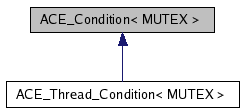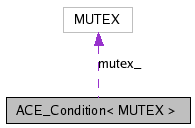
#include <Condition_T.h>
Inheritance diagram for ACE_Condition< MUTEX >:


Public Member Functions | |
| ACE_Condition (MUTEX &m, int type=USYNC_THREAD, const ACE_TCHAR *name=0, void *arg=0) | |
| Initialize the condition variable. | |
| ~ACE_Condition (void) | |
| Implicitly destroy the condition variable. | |
| int | wait (const ACE_Time_Value *abstime) |
| int | wait (void) |
| Block on condition. | |
| int | wait (MUTEX &mutex, const ACE_Time_Value *abstime=0) |
| int | signal (void) |
| Signal one waiting thread. | |
| int | broadcast (void) |
| Signal *all* waiting threads. | |
| int | remove (void) |
| Explicitly destroy the condition variable. | |
| MUTEX & | mutex (void) |
| Returns a reference to the underlying mutex_;. | |
| void | dump (void) const |
| Dump the state of an object. | |
Protected Attributes | |
| ACE_cond_t | cond_ |
| Condition variable. | |
| MUTEX & | mutex_ |
| Reference to mutex lock. | |
Private Member Functions | |
| void | operator= (const ACE_Condition< MUTEX > &) |
| ACE_Condition (const ACE_Condition< MUTEX > &) | |
A condition variable enables threads to atomically block and test the condition under the protection of a mutual exclu- sion lock (mutex) until the condition is satisfied. That is, the mutex must have been held by the thread before calling wait or signal on the condition. If the condition is false, a thread blocks on a condition variable and atomically releases the mutex that is waiting for the condition to change. If another thread changes the condition, it may wake up waiting threads by signaling the associated condition variable. The waiting threads, upon awakening, reacquire the mutex and re-evaluate the condition. Note, you can only parameterize <ACE_Condition> with ACE_Thread_Mutex, ACE_Recursive_Thread_Mutex, or ACE_Null_Mutex.
| ACE_Condition< MUTEX >::ACE_Condition | ( | MUTEX & | m, | |
| int | type = USYNC_THREAD, |
|||
| const ACE_TCHAR * | name = 0, |
|||
| void * | arg = 0 | |||
| ) |
Initialize the condition variable.
| ACE_Condition< MUTEX >::~ACE_Condition | ( | void | ) |
Implicitly destroy the condition variable.
| ACE_Condition< MUTEX >::ACE_Condition | ( | const ACE_Condition< MUTEX > & | ) | [private] |
| ACE_INLINE int ACE_Condition< MUTEX >::broadcast | ( | void | ) |
Signal *all* waiting threads.
| ACE_BEGIN_VERSIONED_NAMESPACE_DECL void ACE_Condition< MUTEX >::dump | ( | void | ) | const |
Dump the state of an object.
Reimplemented in ACE_Thread_Condition< MUTEX >, and ACE_Thread_Condition< ACE_Thread_Mutex >.
| ACE_INLINE MUTEX & ACE_Condition< MUTEX >::mutex | ( | void | ) |
Returns a reference to the underlying mutex_;.
| void ACE_Condition< MUTEX >::operator= | ( | const ACE_Condition< MUTEX > & | ) | [private] |
| ACE_BEGIN_VERSIONED_NAMESPACE_DECL ACE_INLINE int ACE_Condition< MUTEX >::remove | ( | void | ) |
Explicitly destroy the condition variable.
| ACE_INLINE int ACE_Condition< MUTEX >::signal | ( | void | ) |
Signal one waiting thread.
| int ACE_Condition< MUTEX >::wait | ( | MUTEX & | mutex, | |
| const ACE_Time_Value * | abstime = 0 | |||
| ) |
Block on condition or until absolute time-of-day has passed. If abstime == 0 use "blocking" wait() semantics on the <mutex> passed as a parameter (this is useful if you need to store the <Condition> in shared memory). Else, if <abstime> != 0 and the call times out before the condition is signaled <wait> returns -1 and sets errno to ETIME.
| int ACE_Condition< MUTEX >::wait | ( | void | ) |
Block on condition.
| int ACE_Condition< MUTEX >::wait | ( | const ACE_Time_Value * | abstime | ) |
Block on condition, or until absolute time-of-day has passed. If abstime == 0 use "blocking" <wait> semantics. Else, if <abstime> != 0 and the call times out before the condition is signaled <wait> returns -1 and sets errno to ETIME.
ACE_cond_t ACE_Condition< MUTEX >::cond_ [protected] |
Condition variable.
MUTEX& ACE_Condition< MUTEX >::mutex_ [protected] |
Reference to mutex lock.
 1.4.7-1
1.4.7-1